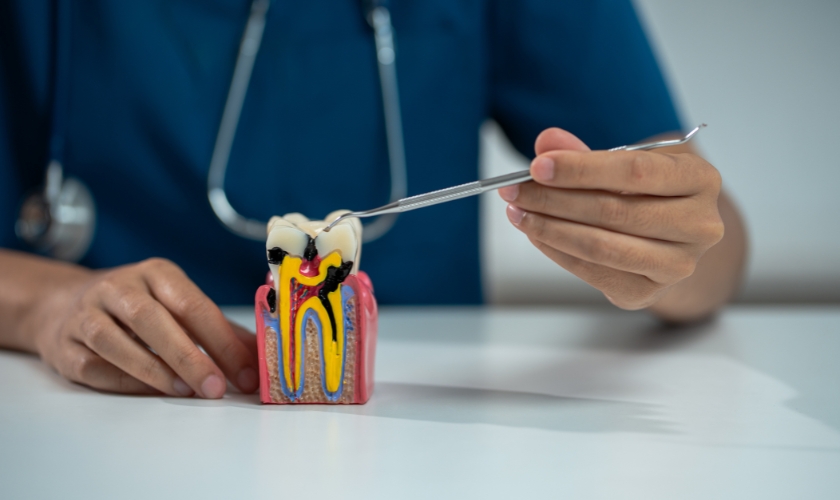
Can A Tooth Abscess Heal On Its Own? Breaking The Misconception
tooth abscess is a painful dental condition that occurs when a bacterial infection creates a pocket of pus in the tooth or surrounding tissues. While many believe a tooth abscess may heal on its own, this is a dangerous misconception that can lead to severe health complications.
Today’s blog will explain what a tooth abscess is, why it cannot heal without professional treatment, the risks of ignoring it, and the steps you can take to protect your oral and overall health.
Tooth Abscess: A Brief Overview
A tooth abscess develops when bacteria invade the dental pulp, gums, or surrounding tissues, often as a result of untreated decay, gum disease, or trauma.
Types of Tooth Abscesses
- Periapical Abscess: Forms at the tip of a tooth’s root.
- Periodontal Abscess: Occurs in the gums, usually near the tooth’s root.
Common Causes
- Untreated Cavities: Bacteria penetrate the enamel and dentin to reach the pulp.
- Gum Disease: Infections in the gums can lead to abscess formation.
- Tooth Trauma: Chips, cracks, or injuries create entry points for bacteria.
Its Signs & Symptoms
It’s essential to recognize the signs of a tooth abscess early to seek timely treatment:
- Severe, throbbing pain in the tooth or gums.
- Swelling in the face or jaw.
- Fever and general malaise.
- Sensitivity to hot and cold temperatures.
- Bad breath or a foul taste in the mouth.
- Difficulty chewing or biting.
- Swollen lymph nodes in the neck or jaw.
Why a Tooth Abscess Cannot Heal On Its Own?
Contrary to popular belief, a tooth abscess cannot resolve itself without medical intervention. Here’s why:
1. The Nature of Bacterial Infections
- Enclosed Environment: The infection is trapped within the tooth or gums, making it difficult for the body’s immune system to fight it.
- Bacterial Growth: Bacteria continue to multiply, worsening the infection over time.
2. Temporary Ruptures Are Not Healing
- Sometimes, an abscess may rupture, releasing pus.
- While this may provide temporary relief, the infection itself persists, often spreading to surrounding tissues.
3. Long-Term Risks Without Treatment
- Tooth Loss: Prolonged infections weaken the tooth structure and supporting bones.
- Systemic Issues: Infections can spread to other parts of the body, causing severe complications.
Risks of Leaving a Tooth Abscess Untreated
Ignoring a tooth abscess can lead to serious health consequences:
1. Spread of Infection
- Cellulitis: The infection can extend to the skin, causing swelling and redness.
- Bone Loss: Surrounding bone may erode due to the persistent infection.
2. Formation of Dental Cysts
- An untreated abscess can lead to the formation of a cyst near the tooth root, requiring surgical intervention.
3. Life-Threatening Complications
- Sepsis: The infection can spread to the bloodstream, potentially becoming fatal.
- Brain Abscess: In rare cases, the infection can travel to the brain, leading to neurological complications.
Treatment Options for a Tooth Abscess
Professional dental care is the only way to effectively treat a tooth abscess. Here are the common treatment options:
1. Drainage of the Abscess
- The dentist creates an incision to drain the pus, relieving pain and pressure.
2. Root Canal Therapy
- Removes the infected pulp, cleans the root canals, and seals the tooth to prevent reinfection.
3. Tooth Extraction
- In cases of severe damage, the tooth may need to be removed to stop the spread of infection.
4. Antibiotics
- Prescribed if the infection has spread beyond the tooth to other areas.
Tooth Abscess Prevention
Prevention is always better than cure. Here are practical steps to reduce your risk of developing a tooth abscess:
1. Maintain Excellent Oral Hygiene
- Brush twice daily with fluoride toothpaste.
- Floss daily to remove plaque between teeth.
- Use an antibacterial mouthwash for added protection.
2. Schedule Regular Dental Visits
- Visit our dentist every 6 months for checkups and cleanings.
- Early detection of cavities and gum disease can prevent abscess formation.
3. Address Dental Issues Promptly
- Treat cavities, cracks, or injuries as soon as they occur.
- Don’t ignore persistent tooth pain or sensitivity.
4. Eat a Tooth-Friendly Diet
- Limit sugary and acidic foods that promote decay.
- Include calcium-rich foods to strengthen teeth.
5. Use a Mouthguard
- Protect your teeth from trauma during sports or other activities.
Common Myths Surrounding This Dental ISuue
Let’s debunk some common misconceptions:
- “The pain will go away on its own.”
Pain may subside temporarily, but the infection remains active. - “Home remedies can cure it.”
While home remedies may alleviate discomfort, they cannot eliminate the infection. - “Antibiotics alone can fix it.”
Antibiotics help control the infection but do not address the root cause.
A tooth abscess is a serious dental condition that requires immediate professional care. It cannot heal on its own, and ignoring it can lead to severe complications, including systemic infections and tooth loss.
If you suspect you have a tooth abscess, don’t wait. Schedule an appointment with our dentist and get the care you need to prevent further complications.

